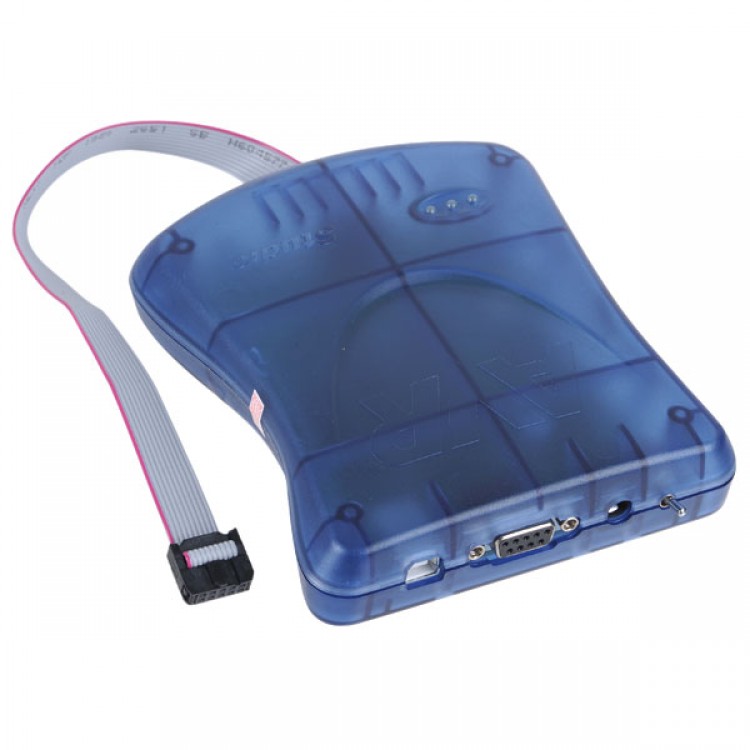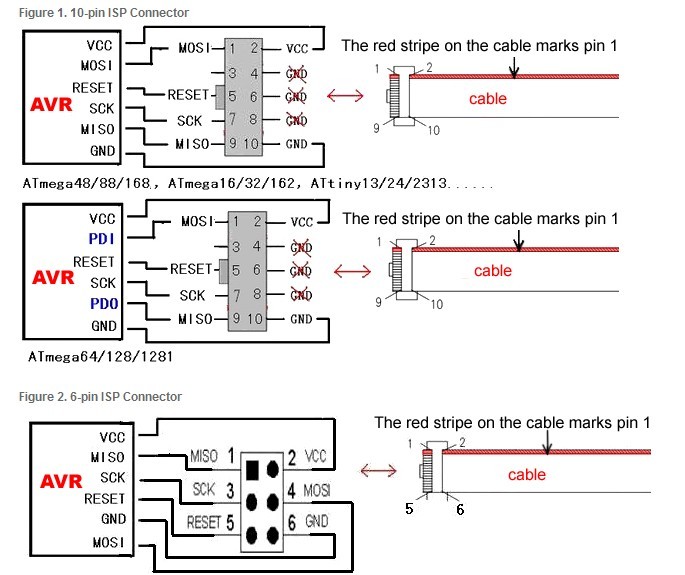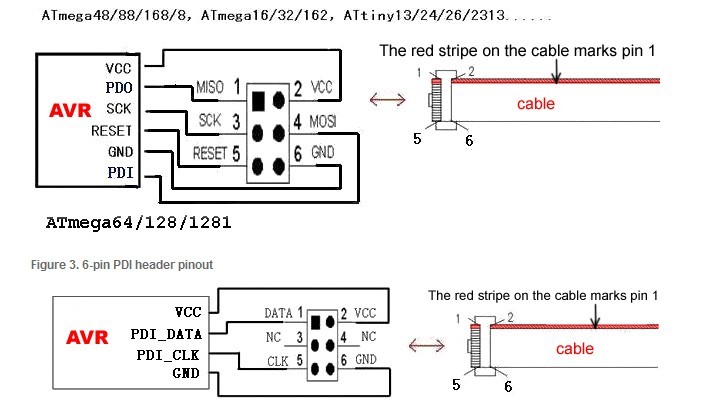
| Quantity | 3+ units | 10+ units | 30+ units | 50+ units | More |
|---|---|---|---|---|---|
| Price /Unit | $45.88 | $44.95 | $43.54 | $41.67 | Contact US |
 FMD Writer MCU Programmer Chip Programmer Tool Designed for 8-bit Microcontrollers Produced by FMD
$60.24
FMD Writer MCU Programmer Chip Programmer Tool Designed for 8-bit Microcontrollers Produced by FMD
$60.24
 Matrix:bit V2.0 Development Board Programming Control Board (Pink with Type-C Port) + Data Cable
$21.09
Matrix:bit V2.0 Development Board Programming Control Board (Pink with Type-C Port) + Data Cable
$21.09
 Matrix:bit V2.0 Development Board Programming Control Board (Black with Type-C Port) + Data Cable
$21.09
Matrix:bit V2.0 Development Board Programming Control Board (Black with Type-C Port) + Data Cable
$21.09
Emulator USB AVR ISP mkII Debugger Programmer Compatible AVRISP PDI TPI
Introduction to the USB AVRISP mkII
A professional In-System Programmer. Supports all AVR devices with ISP or PDI interface, including XMEGA. Compatible with AT AVRISP mkII from ATMEL.
Features
- Supports all AVR devices with ISP or PDI interface, and certain 51 Devices
- Programs both Flash and EEPROM
- Supports Fuses and Lock Bit Programming
- Based on AT AVRISP mkII firmware
- Upgradable to Support Future Devices
- Adjustable ISP programming speed up to 8M frequency
- USB 2.0 compliant (full speed, 12Mbps)
- 3 optional cables to target board
- Powered from USB bus, does not require external power supply
Device Support
- USB AVRISP mkII supports all AVR devices with ISP and PDI Interface. Support for new devices will be added with new versions of AVR Studio.
- Supports AT86RF401/AT89S51/AT89S52
Refer to AVRStudio 4.19 version, the following devices are supported:
| ISP | ATmega |
|---|---|
| ATmega128 ATmega1280 ATmega1281 ATmega1284 ATmega1284P ATmega128A ATmega128RFA1 ATmega16 ATmega162 ATmega164A ATmega164P ATmega164PA ATmega165 ATmega165A ATmega165P ATmega168 ATmega168A ATmega168P ATmega168PA ATmega169 ATmega169A ATmega169P ATmega169PA ATmega16A ATmega16HVB ATmega16U2 ATmega16U4 ATmega2560 ATmega2561 ATmega32 ATmega324A ATmega324P ATmega324PA ATmega325 ATmega3250 ATmega3250A ATmega3250P ATmega3250PA ATmega325A ATmega325P ATmega3250PA ATmega328 ATmega328P ATmega329 ATmega3290 ATmega3290A ATmega3290P ATmega3290PA ATmega329A ATmega329P ATmega329PA ATmega32A ATmega32C1 ATmega32HVB ATmega32M1 ATmega32U2 ATmega32U4 ATmega32U6 ATmega48 ATmega48A ATmega48P ATmega48PA ATmega64 ATmega640 ATmega644 ATmega644A ATmega644P ATmega644PA ATmega645 ATmega6450 ATmega6450A ATmega6450P ATmega645A ATmega645P ATmega649 ATmega6490 ATmega6490A ATmega6490P ATmega649A ATmega649P ATmega64A ATmega64C1 ATmega64M1 ATmega8 ATmega8515 ATmega8535 ATmega88 ATmega88A ATmega88P ATmega88PA ATmega8A ATmega8HVD ATmega8U2 | |
| ATtiny | |
| ATtiny12 ATtiny13 ATtiny13A ATtiny15 ATtiny167 ATtiny2313 ATtiny2313A ATtiny24 ATtiny24A ATtiny25 ATtiny26 ATtiny261 ATtiny261A ATtiny4313 ATtiny43U ATtiny44 ATtiny44A ATtiny45 ATtiny461 ATtiny461A ATtiny48 ATtiny84 ATtiny84A ATtiny85 ATtiny861 ATtiny861A ATtiny87 ATtiny88 | |
| Other | |
| AT90CAN128 AT90CAN32 AT90CAN64 AT90PWM2 AT90PWM216 AT90PWM2B AT90PWM3 AT90PWM316 AT90PWM3B AT90USB1286 AT90USB1287 AT90USB162 AT90USB646 AT90USB647 AT90USB82 | |
| PDI | ATxmega |
| ATxmega128A1 ATxmega128A1_revD ATxmega128A1U ATxmega128A3 ATxmega128A3U ATxmega128D3 ATxmega16A4 ATxmega16A4U ATxmega16D4 ATxmega192A3 ATxmega192A3U ATxmega192D3 ATxmega256A3 ATxmega256A3U ATxmega256A3B ATxmega256A3BU ATxmega256D3 ATxmega32A4 ATxmega32A4U ATxmega32D4 ATxmega64A1 ATxmega64A3 ATxmega64A3U ATxmega64D3 | |
| TPI | ATtiny |
| ATtiny10 ATtiny20 ATtiny4 ATtiny40 ATtiny5 ATtiny9 |
*Supports all the different voltages and speed grade versions of the devices listed in the table above.
Performance
- High speed programs FLASH , EEPROM, Fuses, and Lock Bit
- It takes only 2.5S to program a 12K program file with verification (programming speed was set to 1M while the Max speed could be up to 8M)
Connects to PC
- Uses a USB interface for communication with the front-end software (Probably AVR Studio)
- Using PDIUSBD12, USB 1.1 (USB 2.0 Full Speed) 12Mbits/second
- Each USB AVRISP mkII has a unique ID, a PC could connects to several Devices at the same time
Connects to target board
The USB AVRISP mkII connects to the target board through 4 optional cables. Depending on the existed connector on the target board, the cable has to be changed accordingly.
- Standard 6-pin ISP Connector, Using 6-pin ISP cable
- Standard 6-pin PDI Connector, Using 6-pin PDI cable
- Standard 6-pin TPI Connector, Using 6-pin TPI cable
- Standard 10-pin ISP Connector, Using 6-pin to 10-pin ISP cable
The figure 1, 2 and 3 shows the header pinouts of different interfaces.


Powered from USB bus
- Draws power from the USB bus, No need for Additional Power Supply
- The target board should be powered from Another Power Supply